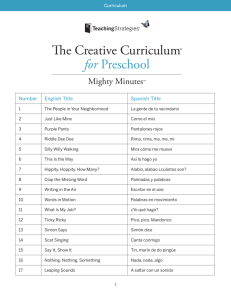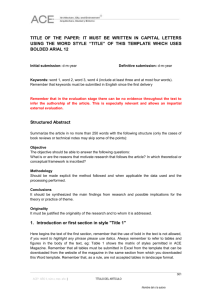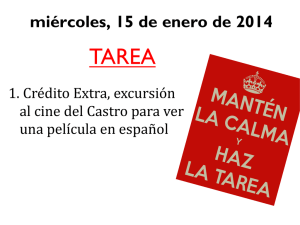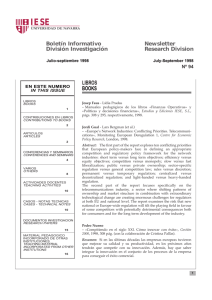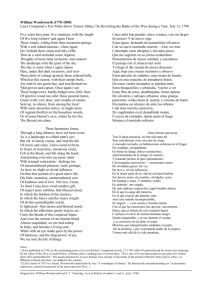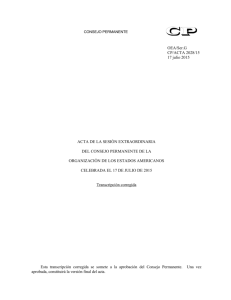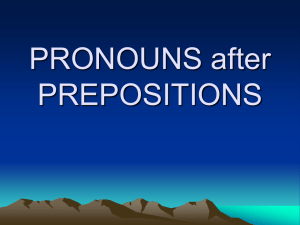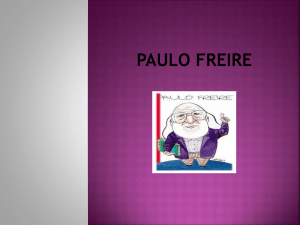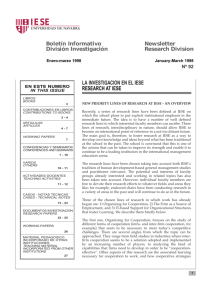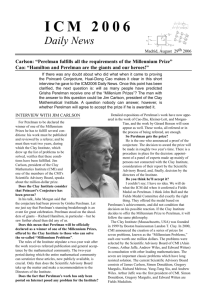32 nd ACIS CONFERENCE, 1-2 SEPTEMBER 2011 ABSTRACTS
advertisement
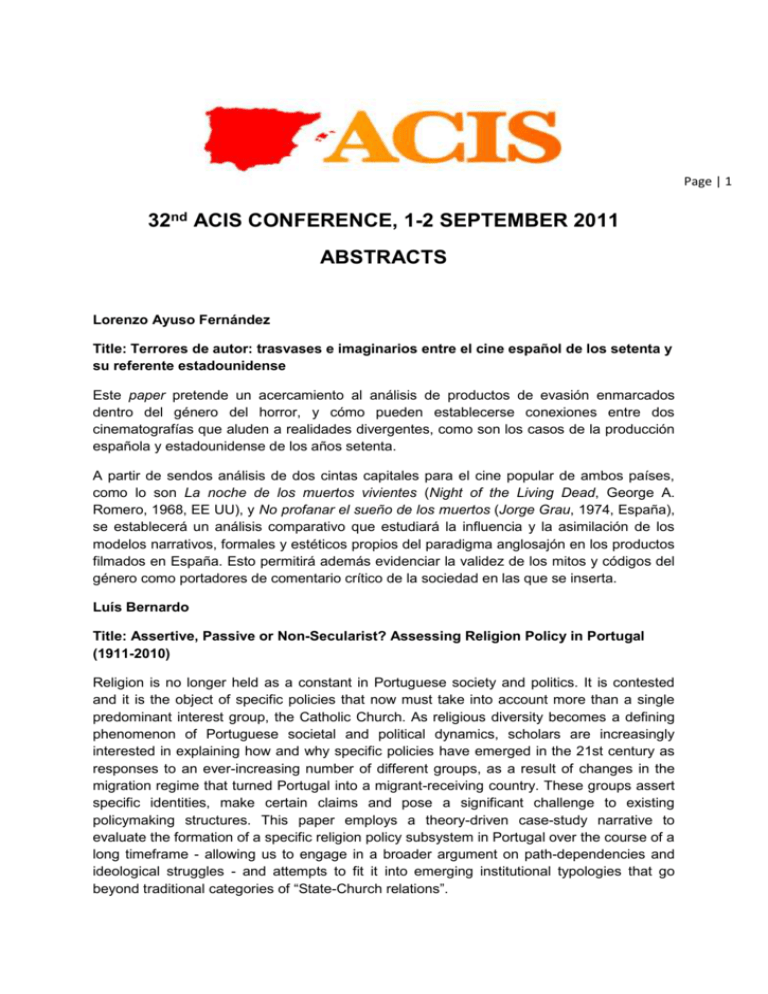
Page | 1 32nd ACIS CONFERENCE, 1-2 SEPTEMBER 2011 ABSTRACTS Lorenzo Ayuso Fernández Title: Terrores de autor: trasvases e imaginarios entre el cine español de los setenta y su referente estadounidense Este paper pretende un acercamiento al análisis de productos de evasión enmarcados dentro del género del horror, y cómo pueden establecerse conexiones entre dos cinematografías que aluden a realidades divergentes, como son los casos de la producción española y estadounidense de los años setenta. A partir de sendos análisis de dos cintas capitales para el cine popular de ambos países, como lo son La noche de los muertos vivientes (Night of the Living Dead, George A. Romero, 1968, EE UU), y No profanar el sueño de los muertos (Jorge Grau, 1974, España), se establecerá un análisis comparativo que estudiará la influencia y la asimilación de los modelos narrativos, formales y estéticos propios del paradigma anglosajón en los productos filmados en España. Esto permitirá además evidenciar la validez de los mitos y códigos del género como portadores de comentario crítico de la sociedad en las que se inserta. Luís Bernardo Title: Assertive, Passive or Non-Secularist? Assessing Religion Policy in Portugal (1911-2010) Religion is no longer held as a constant in Portuguese society and politics. It is contested and it is the object of specific policies that now must take into account more than a single predominant interest group, the Catholic Church. As religious diversity becomes a defining phenomenon of Portuguese societal and political dynamics, scholars are increasingly interested in explaining how and why specific policies have emerged in the 21st century as responses to an ever-increasing number of different groups, as a result of changes in the migration regime that turned Portugal into a migrant-receiving country. These groups assert specific identities, make certain claims and pose a significant challenge to existing policymaking structures. This paper employs a theory-driven case-study narrative to evaluate the formation of a specific religion policy subsystem in Portugal over the course of a long timeframe - allowing us to engage in a broader argument on path-dependencies and ideological struggles - and attempts to fit it into emerging institutional typologies that go beyond traditional categories of “State-Church relations”. Georgina Blakeley Title: Necessary but Insufficient? Evaluating Spain’s Law of Historical Memory The Law of Historical Memory approved by both houses of the Spanish parliament on the 26th December 2007 is one of the latest links in a chain of reparatory measures from the earliest days of Spain’s transition to democracy that have attempted to deal with the legacy Page | 2 of the Civil War and the Francoist dictatorship. This paper examines both the first draft of the Bill and the final Law to evaluate the strengths and weaknesses of this piece of legislation as a transitional justice mechanism. It concludes that it falls far short of offering justice in the strict sense of legal accountability, as do many other mechanisms which fit under the broad definition of transitional justice, but this should not obscure its symbolic importance in the struggle to deal with the authoritarian past in Spain. The paper will also put forward some tentative reasons as to why attempts to deal with the past matter even in consolidated democracies like Spain and suggests future research possibilities in this regard. Caterina Duff Burnay & Charo Lacalle Title: Iberian market for Television Fiction: a comparative analysis. Fiction is a mainstay in television programming in the Iberian market. Presented in various formats (telenovelas, series, miniseries, TV movie) since the 90s of last century that has captivated audiences in a transversal way, becoming one of the most important valences in the wars of audiences. The Iberian TV market has been demonstrated particularly active in this field in recent years with the continued production of domestic contents, with its broadcast in prime time, and the diversification of formats. Based on the data collected by the Observatório Iberoamericano da Ficção Televisiva - Obitel (2008 to 2010), we aim to make a comparative analysis between Spain and Portugal, highlighting moments of convergence and divergence on the holding of fictional contents, permitting an assessment of TV Iberian market behavior. Ana Cristina Pires Cachola Title: Warscapes, the figures and their absence: The War on Terror in Portuguese contemporary art Taking Portuguese artistic pieces on “the War on Terror” as a starting point, this paper aims to analyse how contemporary artists deconstruct and subvert the visual canon of war and atrocity, from a specific position on world’s geography (Portugal), exploring their role in the mediation of recent world history. I would like to present two examples, the photographic project “3.16“ (2003) of Augusto Alves da Silva and the film “Visionary Iraq” (2009) of Gabriel Abrantes. The two works were referring to different events that evoked distinct warscapes on the same event: the meeting with George W. Bush, Tony Blair and Jose María Aznar at Azores and the "moment of truth" for the War on Iraq and the war’s field of this conflict. Through the analysis undertaken, the visibility and invisibility of war is discussed, along with its relationship to the content as well as the visual strategies used by Portuguese contemporary artists to examine global issues. Luís Correia Carmelo Title: Storytelling revival in Portugal and Spain As in other countries, the nineties were the stage for a new dynamic around storytelling in Portugal and Spain, first in the context of libraries and schools, later, to other audiences and contexts. Although the term "revival" is debatable, especially due to its suggestion of a Page | 3 lineage with the traditional practices of oral storytelling, the truth is that a group of people took over and assumed the character of a "movement" dedicated to the practice of storytelling, allowing us to witness a proliferation of professionals, organizations and events that have gained, over the past two decades, a remarkable visibility. This dynamic, centered in Portugal at the festival “Palavras Andarilhas” (Wanderers Words) in Beja and in Spain, at the “Festival de Narriación Oral” (Festival of Oral Narration) in Guadalajara, allows us to think of the emergence of a new artistic discipline within the performing arts that increasingly takes its place in the cultural “panorama” of both countries. Gabrielle Carty Title: Generic Convention and Innovation in La vida en un hilo, 1945, directed by Edgar Neville This paper focuses on a remarkable romantic comedy film made in 1940s Spain, La vida en un hilo. Despite the place and time of the film’s production and its rather unusual structure, La vida en un hilo has numerous quite close parallels with the 1998 film, Sliding Doors directed by Peter Howitt. With these in mind, the paper examines La vida en un hilo and its points of comparison and contrast with Sliding Doors to illustrate its particular inflection of the generic elements of destiny and chance in romantic comedy and how Neville uses generic convention and innovation to reflect on the role of women in society and to articulate a critique of contemporary Spanish society. María J. Castro Title: The Portugal that Danced: The Verde Gaio Company and the creation of state propaganda and control and Salazar’s dictatorship. Last century, dance, along with all related activities, attained an important status, both in the artistic sphere, and in political or social levels; thus many nations have also used dance as a tool to ensure authority and power over their citizens. This study may contribute to establish a clear correlation between art and the political power, focusing, in particular, on the role of dance as a vehicle for state propaganda. A good example that confirmed this same strategy was the 'Ballet Russes' (1909-1929) the first dance company to assured a new status for dance. From the beginning, under the command of Serge Diaghilev, the Ballets Russes matured over twenty years into a theater of experiment in relationship with painters, sculptors, composers, choreographers, costumer’s designers, in an artistic confluence never imagined. The heritage of this dance company influenced other dance companies, all centered on the same state-influenced and controlled purposes; one of these has been the 'Verde Gaio', the first national dance company in Portugal, serving both cultural and identity aims and born under the auspices of Salazar's dictatorship. Creative features of the above referred company will be analyzed throughout this research, in order to show the various ways in which propaganda through art and culture is created by dictatorial regimes. David Close & Rosa García-Orellán Title: Pais Vasco y Galicia en sus politicas sanitarias ante la crisis de la globalización. Repercusión en el profesional sanitario En esta presentación se comparan dos comunidades autónomas una rica, es el País Vasco y otra pobre Galicia en el aspecto de sus políticas sanitarias. Ambas han tenido gobiernos conservadores en los últimos veinte años. A pesar de un breve periodo de gobiernos de izquierdas, la privatización de los servicios sanitarios en ambas comunidades es una realidad. En esta presentación se analizará cómo afecta la actual crisis a ambas comunidades en su gestión de políticas sanitarias y concretamente al personal sanitario. La aplicación de políticas conservadoras y las diferencias económicas entre ambas comunidades serán puntos centrales en el análisis. Carlota Coronado Ruiz & Isabel Martín Sánchez Title: La España en tránsito: Imaginario y memoria televisiva del exilio Este paper se interesa por las formas de representación televisiva del exilio político, tomando como base el documental homónimo realizado por TVE y la Fundación Pablo Iglesias (2002), a partir de distintos planos: 1.- La recreación de esta experiencia de migración forzosa desde la mediación televisiva que trabaja con el testimonio personal y la memoria traumática, donde se distinguirían tres enfoques diferenciados: el de los propios exiliados políticos, el de los representantes republicanos y el de los receptores de la inmigración. 2.- La televisión como medio hegemónico en la configuración y circulación de la memoria nacional. Cabe cuestionarse, en este sentido, el carácter singular de TVE como medio público oficial y su implicación con las políticas de Memoria Histórica. 3.- El posible tránsito existente desde lo que se ha denominado como “organización social del olvido” a la reciente “inflación” de producciones audiovisuales que revisan y actualizan las consecuencias de la guerra. Karen Díaz Anchante Title: Habitar el género: “Una mujer desnuda” de Lola Beccaria y la escritura de la sexualidad Este ensayo analiza la novela “Una mujer desnuda” de la escritora gallega Lola Beccaria desde la perspectiva de écriture féminine Hélène Cixous y Luce Irigaray, y la idea de la sexualidad como pilar de la identidad y de la consolidación del Yo. Martina Iranco, la protagonista, debe jugar un papel dual como estrategia de supervivencia en el entorno que suprime sus sentimientos y emociones desde la infancia. Sin embargo, la escritura de sus memorias es la manifestación de su decisión de liberarse del cinturón de castidad y prejuicios que ha intentado reprimirla toda su vida, mostrándose ante todos como agente en la formación de su identidad femenina. Así, la confesión de Martina responde a una necesidad, no de redención, sino de poder ser y mostrarse como una sola entidad Page | 4 finalmente: una mujer que ha sobrevivido a la presión de la convención y el status social gracias al disfrute de su sexualidad, a un comportamiento que apoya la lógica de su discurso femenino, pero que no quiere ocultarse más, sino desnudar su verdadera naturaleza. Mark Gant Title: "I would have come even if the boat had been made of paper" - from Senegal to Palma: migration and storytelling. The paper will introduce and contextualise the experience of Senegalese migrants in Mallorca and the work of Cáritas in welcoming them and providing social care and the space to tell their stories. It will then discuss the role of oral narrative in telling and retelling the migrant journey from the Dakar coast to the Canaries and Balearics and the struggle of life in recession bound Europe, locating this within Wolof tradition. Luis Gomes Title: Identidade Cultural da Não-Espanha: em torno da política cultural do Estado Novo aos nossos días A política cultural do Estado Novo, considerada através da propaganda nacionalista da raça portuguesa, recorreu aos argumentos possíveis na altura. Um dos argumentos, que há séculos faz parte da identidade nacional portuguesa, é a relação de aproximação e afastamento em relação a Espanha/Castela. Um dos momentos do auge deste movimento foi a união, de facto, das duas coroas ibéricas em Filipe II de Espanha, e a leitura que se tem feito deste período tem servido propósitos distintos, à mercê dos valores que se querem promover em cada época. Procura-se discutir este processo, descobrindo a revelia dos nacionalismos e iberismos ao longo dos tempos, através do percurso literário de um autor seiscentista (Vasco Mousinho de Quevedo) e da sua recepção ainda hoje em dia. Amparo Guerra Gómez Title: Transferencias e imaginarios del American Dream en el cine popular español del desarrollismo a la transición Transcurrida una década de Bienvenido Mr. Marshall, celebrada parábola del American Dream a la española, el crecimiento económico que trae a nuestro país el turismo en los 60 y 70 reaviva en la gran pantalla el mito de prosperidad exportado desde Hollywood como sincretismo cultural, no tanto de lo norteamericano como de lo extranjero en general, y sustituto mediático del ausente aperturismo político. Así sucede con la corriente del denominado landismo (Alfredo Landa), o con el cine “del destape”, donde consumismo en alza, ritmos, modas y estética pop conviven con la alabanza de la virilidad ibérica, los valores tradicionales y el folklore patrio. A partir de comedias de la época, el presente estudio analiza percepciones y transferencias socioculturales del modelo estadounidense en la construcción cinematográfica del imaginario español del tardofranquismo, su relativo impacto en las mentalidades y las resistencias/contradicciones históricas presentes en el cine comercial. Page | 5 resistencias/contradicciones históricas presentes en el cine comercial. Gisela Guevara Title: Portuguese geopolitics at the beginning of the 20th century Portugal´s role in Africa at the beginning of the 20th century was oft misjudged by scholars Page | 6 that saw the country´s foreign policy in African affairs merely as the result of pressures by the great European powers, such as Great Britain, France or the German Empire. This paper aims to show that, on the contrary, the little country played an important role in European politics regarding Africa, contributing to the decrease of tensions between rivals, mainly between the British Empire and Germany. Furthermore, it analyses how the Portuguese monarchy used the geopolitical significance of its African colonies to protect itself from the threats to its sovereignty on the part of the great powers. Based mainly on the research pursued by the author in German and Portuguese archives, the paper attempts to bring new light to the research on Portugal´s role in Europe in the context of the scramble for Africa. Charo Lacalle Title: The building of youth identities in Spanish television fiction This proposal summarizes an investigation regarding the construction of youth identity in the Spanish television fiction, granted by the Spanish Ministry of Science and Technology. The wear of the sitcom, after almost two decades of popularity, and the hybridization of the drama with other genres such as action, mystery or fantasy, has led the Spanish generalist channels to aim with even more precision for the youth target. The introduction of more appealing issues to young viewers as well as the increasing leading role played by postadolescents and young people, are the most visible effects of the premiered productions of recent years. The socio-semiotic analysis of young characters presented, highlights the increasing importance of this age group (15-29 years old) regarding the rest of the groups, as well as the introduction of new prototypes, which are dramatically modifying the roles assumed by the traditional representations of young people on television fiction. Jared D. Larson Title: Public Opinion and the Fear of Contemporary Immigration to Spain and Portugal: Measuring the Perception of Economic, Security and Cultural Threats in Iberia Migration to the Iberian countries is a relatively new phenomenon and the politicisation of immigration policy is consequently even more recent. Curiously enough, despite being an extremely salient topic in contemporary European politics, the backlash against immigration in both Spain and Portugal has shown to not be nearly as negative as in other EU member states. Public opinion data in the Iberian countries tend to be more favourable towards migrants and certain policies pertaining to immigration and integration in Spain and Portugal have been praised for their openness and effectiveness. How do we explain these realities? This paper will examine how the public and elites respond to immigration today in the Peninsula---specifically considering perceptions of and reactions to the threats migration usually pose in the economic, security and cultural spheres---while also considering the historical, economic and cultural factors that are unique to the Iberian context which are both capable of either tempering or inflaming negative sentiments toward immigrants. Rita Luís Title: Press and the Iberian democratic transition processes This communication aims to compare Portugal and Spain’s trajectories towards their press freedom laws, after the downfall of both dictatorships in the 1970’s. Both Estado Novo- in Portugal - and Franquismo – in Spain – founded their control of society through the control of the press. In Spain the so call Fourth Estate was even conceived as a public service under ruling of the State. Both countries found their path to democracy through opposite formulasa revolution in Portugal and a law-by-law transition in Spain - and their way of abolishing censorship reflects it. Following the building of both Portugal and Spain censorship devices and its subsequent dismantling will allow us to reflect on different manners of dealing with new found freedom. John McCulloch Title: Cultural Nomadism in 20th century Spain One of the key questions confronting any serious attempt to re-consider Spain's cultural history of the 20th and 21st century, needs to engage with what are the moments, events and network of material processes which have shaped Spain's socio-cultural evolution. All too often there has been a tendency to group socio-cultural events around generational culmination points, be it the Generation 1898 novelists, or the Generation of 1927 poets, which have often been reinforced through an educational curriculum which has prioritised human agency over and above emergent processes. These paradigms have often morphed into essence-like structures, whereby material processes have been periodically displaced by metaphor and subjective projections. Artificial canonical constructions have included and excluded certain voices, providing a highly selective (and partial) view of Spain’s cultural history. The objective of this paper is to move away from this paradigm, and to reposition Spanish cultural and literary history in terms of an emergent interplay of socio-cultural networks, whereby cultural history is understood through the flow and 'nomadic flight' of material events/objects that develop into new systems of thought and assemblages. Moving away from unhelpful binary oppositions between agency and structure, or the individual and society, I am interested in how certain cultural/ historical events interact and take shape through an interaction of competing forces. I will be looking at one or two textual examples of the above, which will offer new entry points into 20th century Spanish cultural history (when I refer to text I do so in its broadest sense). Page | 7 Lluís Medir Title: Local Democracy in Catalonia: From Formally Institutionalized Processes towards Self-organized Social Referenda for Independence This paper aims to identify and describe the explanatory variables for two quite contradictory movements which seek to reinvigorate local democracy in Catalonia. On the one hand, we Page | 8 analyze the institutional movement conducted by the Generalitat of Catalonia (the Catalan government) to promote local democracy and participatory processes at the local level, which is directly embedded in the local policy-making process. On the other hand, we focus on the self-organized processes of local referenda in favour of Catalan independence, conducted exclusively by self-organized and ideologically oriented citizens in each locality, without any kind of direct institutional support. In 2008, we counted up to 874 instruments created by local governments to promote the participatory process, while from 2009 to 2011 more than 500 localities have held referenda on independence. Both movements are extensive enough to be interpreted as an important turning point in recent Catalan history. The main goal of both movements, despite their different natures, is to create and promote capacity building and civic engagement. Nevertheless, they also emphasize two very different understandings of local democracy. While the goals of the institutionalized movements seek to incorporate citizens into the existent institutional framework, the selforganized referenda promote a path to break free from the Spanish constitutional status quo. This paper will link both contradictory processes, by highlighting their main features, tracing their historical roots and explaining their main outcomes. Miguel Olid Suero Title: La censura contra el humor durante la dictadura de Franco: el caso de Eduardo García Maroto. Eduardo García Maroto debutó durante la II República con una trilogía de cortometrajes paródicos de los géneros del cine (Una de fieras, Una de miedo y Una de ladrones) con los que logró el reconocimiento del público y el aplauso de la crítica. Fue contratado por Cifesa para rodar su primer largometraje, La hija del penal, que confirmó su talento para la comedia. Pero su prometedora carrera se truncó por la Guerra Civil. El rodaje de su segunda película estaba previsto para octubre de 1936 pero quedó, lógicamente, cancelado. Comenzó entonces una segunda etapa en la que sus guiones más divertidos y ocurrentes eran sistemáticamente rechazados por la censura, por lo que se vio obligado a aceptar encargos de guiones mediocres y alejados de su universo personal. De este modo, la censura acabó con la carrera de un cineasta que revolucionó la comedia en el cine español y cuya influencia llegó hasta Luis García Berlanga, como este cineasta reconoció. Tobias Reckling Title: “New Era in Spain”. Foreign correspondents and the perception of the Spanish transition to democracy In discussions of transnational approaches to the study of contemporary history, the role of specific actors has been given considerable attention. In this context, also in the study of the Spanish transition to democracy the importance of transnational actors such European Social and Christian Democratic Party networks have received increasing attention over the last years. Against this background and my own doctoral research this paper aims at shedding new light on a so far hardly researched aspect of the Spanish transition: the role of foreign correspondents in Spain before and during the transition to democracy. By understanding Page | 9 foreign correspondents as transnational cultural brokers who were involved in various informal and formal networks, it will be the aim of this paper to highlight especially two aspects of the importance of foreign correspondents in Spain during the 1970’s. First, by examining their networks in Spain and by applying sociological concepts such as collective learning I will examine the collective construction of specific images of Spain against the specific national, political and biographical backgrounds of the respective journalists. Second and in this context of greater importance, I aim at stressing their importance for the political opposition in Spain before and during the transition to democracy. Especially this aspect is a promising approach since it will highlight the so far overlooked importance of foreign media and their correspondents for the political opposition in Spain. This paper will be based on journalistic articles in German, British and French quality newspapers, interviews with former correspondents in Great Britain, France, Germany and Spain and the examination of documents in Spanish archives. Margarida Rendeiro Title: Mapping Lisbon through the eyes of Portuguese Novelists after 1974: The Lisbon of Baptista-Bastos and José Cardoso Pires Lisbon has been the place of living of many Portuguese characters in the literature produced by various Portuguese novelists and poets. This paper deals with the period following 1974 and looks into Cão Velho entre Flores by Baptista-Bastos (1974) and A República dos Corvos by José Cardoso Pires (1988). The purpose is to establish a map of the city of Lisbon with its traditional neighbourhoods and their dynamical social relations. The Lisbon that emerges in those novels is different from that depicted in the literature published before the Revolution. After 1974, Lisbon underwent a process of gradual change, strengthened by migrating flows towards dormitories in the periphery of the city. This phenomenon emerged during the Estado Novo, with the rural exodus in the 1950s but remained non-existent in Portuguese literature up till 1974, in particular that rewarded by the Estado Novo. Jenny Romero Title: De ahora en adelante: The 'Transitional' Stardom of Rocío Jurado Known as "la más grande" for her prodigious voice and outsized personality, the singer Rocío Jurado has achieved an almost mythic status in Spain. In this paper I explore Jurado's stardom during the 1970s, when she rose to prominence and featured regularly in films, in concerts, and on television, as well as in the popular press. Although commonly associated with the traditional genres of copla and flamenco, she disregarded attempts to stereotype her as a folklórica. Instead, she sought to modernize the performance of Spanish music both artistically and aesthetically. In so doing, she challenged long-held notions of Spanish femininity, providing a striking model for women trying to navigate the complex social shifts that accompanied Spain's transition from authoritarian rule. Consequently, her example illustrates how popular forms of artistic expression have afforded women a space in which to question dominant discourses and transform women's roles. José Carlos Rueda Laffond y Belén Moreno Garrido Title: Un espacio simbólico en tránsito: Imaginario y memoria televisiva del Valle de los Caídos Este paper reflexionará sobre los fenómenos de tránsito o migración simbólica, y sobre las relaciones conflictivas establecidas entre diferentes expresiones de la memoria (individual, colectiva, traumática, mediática…), cuestionándose sus formas de presentación, discusión y negociación en los contextos del franquismo y la España actual. Para ello repasará las distintas significaciones adquiridas por el Valle de los Caídos como localización emblemática en la “geografía de la memoria” (Foote & Azaryahu). Se abordará la evolución simbólica sufrida por este espacio desde su carácter inicial como paradigma en la política franquista hasta la actualidad, en el contexto de su compleja ubicación en la denominada “Ley de Memoria Histórica” (2007). Complementariamente analizará la estrategia de representación televisiva de este referente simbólico, atendiendo a dos cuestiones prioritarias: las formas de actualización y emplazamiento del Valle de los Caídos en la topografía del recuerdo, y su implicación con las formas de representación pública de la historia. Rogério Santos Title: Twenty years of Portuguese commercial television In 2012, Portugal will celebrate the 20th anniversary of commercial television. Portugal was one of the latest EU countries to have private channels. In a previous research, I divided the Portuguese broadcasting history of the last 40 years in four periods, with the help of variables as economic cycle, viewer’s generations and technologies: nationalization (19751985), modernization (1986-1992), media groups (1993-2001), and multimedia (2002-2009). In the first period, there was a State model that followed a long political dictatorship. The modernisation was the transition from monopolistic public television to commercial television, a denationalisation of newspapers and the establishment of free FM radio stations. In the third period we had the creation of groups with considerable dimension (Impresa, Media Capital). Finally, the multimedia period was the establishment of internet development, and audience fragmentation. I want to deepen the last two periods and study the history of the two private channels. Christopher Tulloch Title: Foreign Press Correspondents and the Spanish Transition to Democracy The inevitable death of El Caudillo and the looming uncertainties surrounding the consolidation of King Juan Carlos I and the transition to parliamentary politics made Madrid a hot foreign news spot in the autumn of 1975. The heterogeneous character of the foreign press corps and the strategic decisions made regarding the intensity and focus of their coverage makes for fascinating reading. Where did the correspondents come from? What was their level of knowledge of Spanish politics at the time? What constituted “news” from Page | 10 Spain between 1975 and 1978 for the foreign news desk? This paper offers preliminary results of a research project centred on the coverage of the Spanish transition to democracy by those British, American, French and Italian foreign correspondents charged with covering such groundbreaking moments in contemporary Spanish history. Sandra Tuna Title: On the implications of non-translation in Portuguese advertising: names in cosmetic products as a case in point. The issue of advertising translation inevitably raises the issue of international marketing as a whole. One of the preliminary assumptions underlying product internationalization seems to be the widespread belief in significant similarities between people from different world regions and cultures, which has led to a fairly high degree of standardization in many product features. This is the case of many cosmetic products, sold worldwide with identical advertising strategies. Despite divergent approaches to international campaigns adopted by different cultures/countries, international advertising often raises the issue of translation. Whether translation involves pictorial or textual elements, or both, also seems to depend on cultural issues. In Portugal, international campaigns of cosmetic products seldom involve profound incursions into the advertisement layout. Except for the copy text, there are a series of elements that remain unscathed in Portuguese adverts: overall structure, pictures and names. The present paper will look into this aspect, trying to infer some of the implications that this translational option might bring to cosmetic advertising. Sandra Tuna & Jorge Pedro Sousa Title: The relationship between journalism and society as viewed by Portuguese journalists during the dictatorship (1933-1974): (responsible) journalism as public service. Despite the slow and often complicated process of making journalism a professionalized occupation in Portugal, Portuguese journalists have shown a sense of class from a very early stage. From 1880 several associations emerged, and in 1934, Salazar’s government set up the National Journalists Union – SNJ (Sindicato Nacional dos Jornalistas) – based in Lisbon, while in the north, in Oporto, an existing association – Associação de Jornalistas e Homens das Letras do Porto (Association of Oporto Journalists and Men of Letters) – continued its activity. Both institutions contributed, through several articles in their publications, to theorizing and reflecting upon journalistic activity. Thus, by systematically examining their publications, this study seeks to determine the conceptions on journalism exposed in these texts, and the way they outline journalists’ view on their own role in society and on the social role and function of their activity, especially whether they conceived of journalism as public service. Page | 11 Carmen Usategui Title: Developing reflection through group work and collaborative learning This paper seeks to present an update current research into pedagogical intervention to stimulate critical thinking and collaborative learning at level 4 in a particular module at the Page | 12 University of Chester. The module Pedagogical Practice is delivered to Spanish to Erasmus students with the aim of equipping them with a set of pedagogical principles to be able to lead successfully conversation classes for students of Spanish at this university. The research project –which has been run in the last two academic sessions- rests mainly in social constructivism premises- held by among others (Ushioda, 2003, 2006)- and test the hypotheses that the group plays a key role in gaining and sustaining motivation and student engagement and that cooperation and mutual control contribute to interiorisation of norms. Besides, the project evaluates interventions and results so far. Dr. Danielle Cahill Velardi Title: Ver y ser vistos en la Movida Madrileña Un análisis de la Movida Madrileña no debería negar ni suprimir la importancia y sentido de urgencia por parte de sus miembros de “ver y ser vistos”, algo tan arraigado en el alma española y bien apuntado por Mariano José de Larra unos 150 años antes. Al terminar la década de los 70 y entrar en los primeros años de los 80 este pasatiempo nacional, tan bien delineado por este autor costumbrista decimonónico, se plasmó entre la juventud madrileña ansiosa de movimiento callejero. El momento histórico se presentó favorablemente a la juventud madrileña para “ver y ser vistos” y formaba una parte integral de ese movimiento cultural que explotó después de un largo periodo de oscuridad cultural al acabar la dictadura franquista. El ritual de “maquillarse” antes de salir a la calle y empezar una noche de peregrinaje urbano fue inspirado por un frenesí de emociones causado por las nuevas olas de libertad que permeaba el escenario madrileño en esos años eufóricos. Eran años de apertura en los que iban llegando nuevas formas de vestirse y auto identificarse y gracias al talento español de asimilar lo de afuera a crear algo propiamente suyo, el vestuario dentro de la Movida Madrileña exhibió un especial caso de creación artística única en la historia española. El deseo de cambio mezclado con una enorme inspiración artística servía de fuerza propulsora al destape sociocultural que estaba poniéndose en plena marcha. Después de casi 40 años de restricciones el deseo por lo nuevo y por lo antes prohibido era enorme. La Movida Madrileña brotó dentro de ese campo fértil, sin tener clara consciencia de si misma y solo al ser concebida como un movimiento propiamente cultural se extinguió en su propia comercialización.
